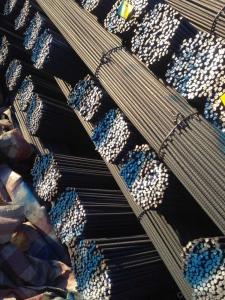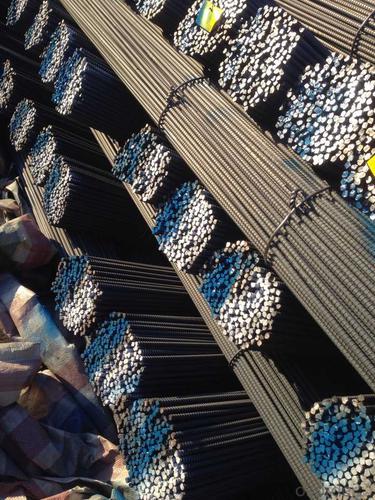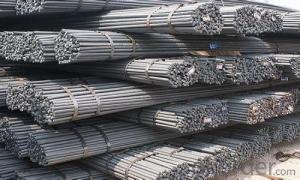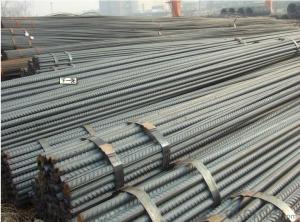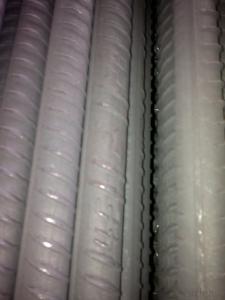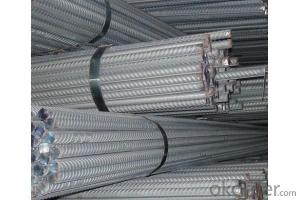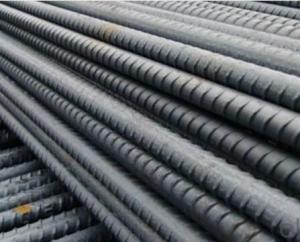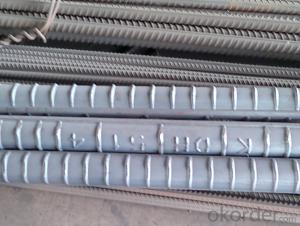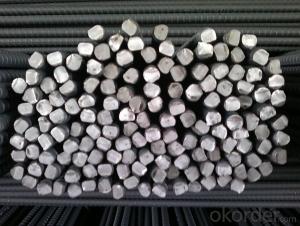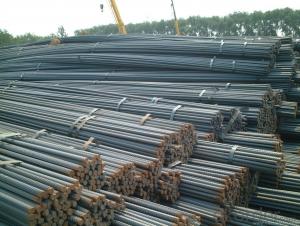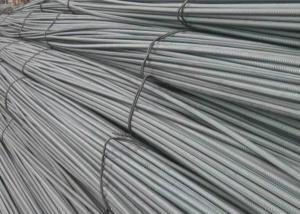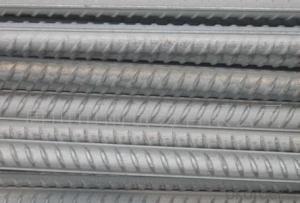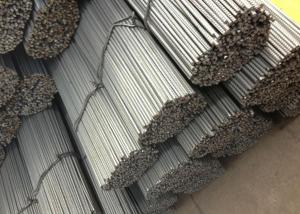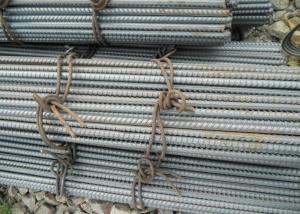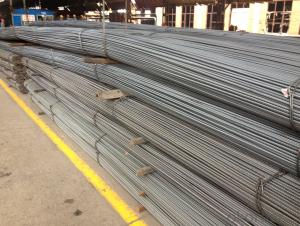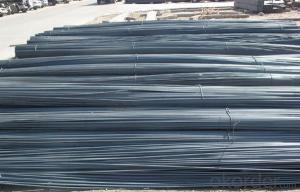Steel Rebars GB Standard with Variety Sizes
- Loading Port:
- China main port
- Payment Terms:
- TT OR LC
- Min Order Qty:
- 100 m.t.
- Supply Capability:
- 10000 m.t./month
OKorder Service Pledge
OKorder Financial Service
You Might Also Like
Product Description:
OKorder is offering Steel Rebars GB Standard with Variety Sizes at great prices with worldwide shipping. Our supplier is a world-class manufacturer of steel, with our products utilized the world over. OKorder annually supplies products to African, South American and Asian markets. We provide quotations within 24 hours of receiving an inquiry and guarantee competitive prices.
Product Applications:
Steel Rebars GB Standard with Variety Sizes are ideal for structural applications and are widely used in the construction of buildings and bridges, and the manufacturing, petrochemical, and transportation industries.
Product Advantages:
OKorder's Steel Rebars GB Standard with Variety Sizes are durable, strong, and wide variety of sizes.
Main Product Features:
· Premium quality
· Prompt delivery & seaworthy packing (30 days after receiving deposit)
· Can be recycled and reused
· Mill test certification
· Professional Service
· Competitive pricing
Product Specifications:
Manufacture: Hot rolled
Grade: HRB335,HRB400,HRB500
Certificates: ISO, SGS, BV, CIQ
Length: 6m – 12m, as per customer request
Packaging: Export packing, nude packing, bundled
| DEFORMED BAR | |
| SIZE d(mm) | theoretical kg/m |
| 6 | 0.222 |
| 8 | 0.395 |
| 10 | 0.617 |
| 12 | 0.888 |
| 14 | 1.21 |
| 16 | 1.58 |
| 18 | 2 |
| 20 | 2.47 |
| 22 | 2.98 |
| 25 | 3.85 |
| 28 | 4.83 |
| 32 | 6.31 |
FAQ:
Q1: Why buy Materials & Equipment from OKorder.com?
A1: All products offered byOKorder.com are carefully selected from China's most reliable manufacturing enterprises. Through its ISO certifications, OKorder.com adheres to the highest standards and a commitment to supply chain safety and customer satisfaction.
Q2: How many tons of steel products could be loaded in containers?
A2: Usually the steel products are delivered by bulk vessel because of the large quantity and the freight. However, there are no bulk vessel enter some seaports so that we have to deliver the cargo by containers. The 6m steel product can be loaded in 20FT container, but the quantity is changed according to the size, usually from 18tons to 25tons.
Q3: How many tons of steel products could be loaded in containers?
A3: Usually the steel products are delivered by bulk vessel because of the large quantity and the freight. However, there are no bulk vessel enter some seaports so that we have to deliver the cargo by containers. The 6m steel product can be loaded in 20FT container, but the quantity is changed according to the size, usually from 18tons to 25tons.
Images:
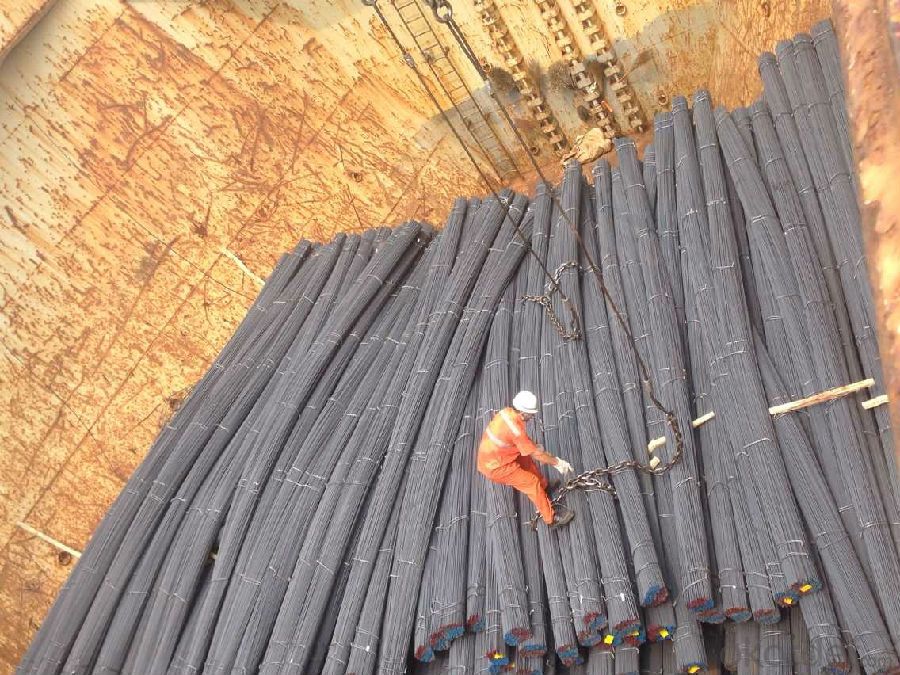
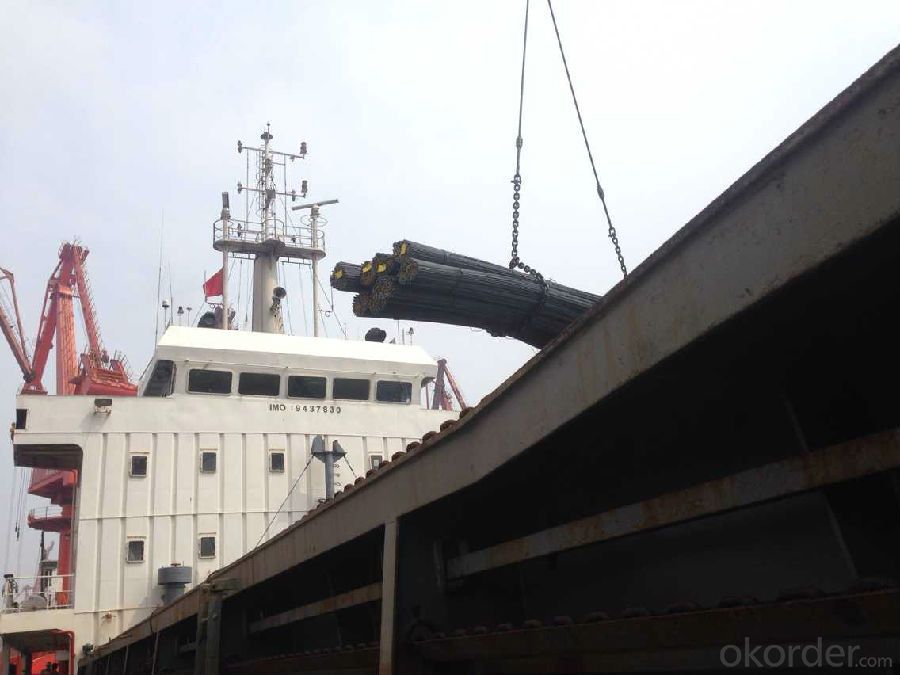
- Q: Are there any standards or codes governing the use of steel rebars in construction?
- Yes, there are several standards and codes that govern the use of steel rebars in construction. These standards and codes ensure the quality, strength, and safety of steel rebars, and they help maintain consistency in their usage across different construction projects. Some commonly followed standards and codes include ASTM A615/A615M, ASTM A706/A706M, and ACI 318 Building Code Requirements for Structural Concrete.
- Q: How do steel rebars improve the strength and durability of concrete?
- Steel rebars improve the strength and durability of concrete in several ways. Firstly, rebars provide reinforcement to the concrete structure, increasing its tensile strength. Concrete is excellent at withstanding compression forces, but it is relatively weak when it comes to tension. By embedding steel rebars within the concrete, the tensile strength of the structure is significantly enhanced. This means that the concrete can resist bending, cracking, and collapsing under heavy loads or external forces. Secondly, steel rebars prevent cracking and shrinkage in the concrete. Concrete tends to shrink as it dries and cures, leading to the development of cracks. However, rebars help to control and restrict this shrinkage by providing additional support and structural integrity. This helps to minimize the occurrence of cracks and ensures that the concrete remains strong and durable over time. Furthermore, steel rebars improve the overall structural stability of the concrete. When concrete is subjected to dynamic loads or seismic activity, it can experience significant deformation or even failure. The presence of rebars helps to distribute the load more evenly throughout the concrete structure, reducing the risk of localized damage or collapse. This enhances the overall stability and safety of the concrete construction. Lastly, steel rebars increase the longevity and durability of concrete structures. The steel used in rebars is highly resistant to corrosion, which is a common issue in concrete exposed to harsh environmental conditions or moisture. By providing a protective layer around the steel, known as passivation, rebars prevent corrosion and maintain the structural integrity of the concrete for an extended period. This ensures that the concrete remains strong, durable, and resistant to degradation over its lifespan. In summary, steel rebars play a crucial role in improving the strength and durability of concrete. They enhance the tensile strength, prevent cracking and shrinkage, enhance structural stability, and increase the longevity of the concrete structure. With the addition of steel rebars, concrete becomes a reliable and long-lasting construction material capable of withstanding various loads and environmental conditions.
- Q: What are the factors that affect the durability of steel rebars in concrete?
- There are several factors that affect the durability of steel rebars in concrete. These include the quality of the steel used, the concrete mix design, the level of exposure to environmental conditions, the presence of moisture and chemicals, and the degree of corrosion protection provided. Other factors such as construction techniques, design considerations, and maintenance practices also play a role in determining the durability of steel rebars in concrete structures.
- Q: What is the average tensile strength of steel rebars?
- The average tensile strength of steel rebars typically ranges from 400 to 600 megapascals (MPa).
- Q: What is the role of steel rebars in road bridge construction?
- The role of steel rebars in road bridge construction is to provide reinforcement and strength to the concrete structure. They are used to enhance the tensile strength of the bridge, as concrete is strong in compression but weak in tension. Steel rebars are embedded within the concrete to resist bending, cracking, and to distribute the loads evenly across the bridge. This reinforcement ensures that the bridge can withstand heavy traffic loads and external forces, making it durable and safe for long-term use.
- Q: Are steel rebars suitable for use in aggressive environments?
- Indeed suitable for use in aggressive environments are steel rebars. Commonly utilized in construction projects, particularly in reinforced concrete structures, steel rebars possess high tensile strength and durability. However, when exposed to corrosive elements like moisture, chloride ions, and chemicals, corrosion may occur, leading to weakened rebars and compromised structural integrity of the concrete. To counteract this issue, protective materials such as epoxy or zinc are often applied to steel rebars, creating a barrier against corrosion. Moreover, stainless steel rebars, with their superior corrosion resistance properties, are also employed in aggressive environments. In conclusion, although steel rebars generally prove suitable for aggressive environments, it is essential to consider specific conditions and implement appropriate protective measures to prevent corrosion and uphold the longevity of the reinforced concrete structure.
- Q: What are the factors that affect the strength of steel rebars?
- The factors that affect the strength of steel rebars include the composition of the steel, the manufacturing process, the presence of impurities, the size and shape of the rebar, and the conditions in which it is used, such as temperature and exposure to corrosion.
- Q: What are the different types of steel rebars used in railway construction?
- There are primarily two types of steel rebars used in railway construction: plain carbon steel rebars and epoxy-coated rebars. Plain carbon steel rebars are commonly used due to their high strength and durability. Epoxy-coated rebars, on the other hand, are used in areas prone to corrosion, as the epoxy coating provides an additional layer of protection against moisture and other corrosive elements.
- Q: How do steel rebars comply with building codes and regulations?
- Steel rebars comply with building codes and regulations by meeting specific requirements outlined in these codes. These requirements include the dimensions, strength, and quality of the rebars, as well as their placement and spacing within the concrete structures. Compliance is ensured through rigorous testing and certification processes, ensuring that the rebars meet the necessary standards for safety and structural integrity in construction projects.
- Q: How are steel rebars used in road and pavement construction?
- Steel rebars are used in road and pavement construction to provide reinforcement and enhance the structural integrity of the concrete. They are placed within the concrete mixture to withstand the tensile forces and prevent cracks or failures in the road or pavement, ensuring durability and longevity of the infrastructure.
Send your message to us
Steel Rebars GB Standard with Variety Sizes
- Loading Port:
- China main port
- Payment Terms:
- TT OR LC
- Min Order Qty:
- 100 m.t.
- Supply Capability:
- 10000 m.t./month
OKorder Service Pledge
OKorder Financial Service
Similar products
Hot products
Hot Searches
Related keywords
